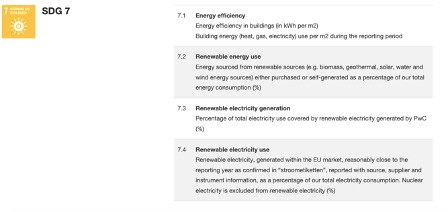Once your team is engaged, how can you integrate your sustainability ambitions into your operating model? Putting in place the right tools and processes to set and measure your targets is key. This will give your team clarity on what success looks like in terms of delivering your strategy.
Where to start?
Prioritise what to measure:
Determine which initiatives are most material and how in practice you will measure them. Subsequently you can translate them into metrics, units and indicators relevant to your business.
Set a realistic time frame to achieve these, involving the team and departments in the process. Consider setting up pilot schemes to assess the feasibility of an initiative and whether you are measuring the right elements.
For example, here are some indicators developed by PWC to set clean energy targets [4]:

Measure your consumption:
Start by measuring your energy and water usage, then look at waste and other relevant metrics to your business activities.
The more you can drill down into your consumption the better, so if you can break it down across different departments or buildings to set more accurate targets. Smart meters [5] are a great tool (and can be installed free of charge by your energy supplier) to measure energy consumption as they give you precise and real-time data.
Record other metrics manually at first if necessary. Consider implementing tally sheets for example, until you can find a more automated way to measure your data.
Collect and collate the data:
Gather and sort the data from each department regularly and systematically. From then on you can then track progress and assess the impact of your measures. Gather them into one document for ease of use. If you use a reporting software this can automate the data analysis and ease report preparation for you.
Incentivise your teams:
Incentivise your staff and managers by integrating sustainability into their performance targets. In practice achieve this by setting SMART goals, KPIs and linking pay or bonuses to their sustainability performance. For example, two thirds of FTSE 100 companies are now linking executive pay to ESG measures [6]. Similarly you can introduce competitions between teams or departments, which will also enhance engagement.
Ensure you have sufficient resources:
You will need these to see through your strategy. To reach your sustainability goals you will need a continuous focus, so be realistic about the resources you may need to deliver it successfully. In particular give some thought to:
- The time needed by members of your team to put in place and monitor initiatives.
- Training resources for your team
- Financial resources required: for example, investing in more energy efficient equipment, access to expert advice or investing in software to automate your data collection and analysis.
Ensure that sustainability has a permanent place on your agenda
Give it a permanent place in performance and motivational meetings and in your annual reports so that you can accurately communicate internally and engage with your external stakeholders too.
Written by Fleur Record Smith and Claire Jones, edited by Rosa Quarato and Rosie Davenport.
References and further reading
[2] https://hbr.org/2017/11/executives-fail-to-execute-strategy-because-theyre-too-internally-focused
[3] https://www.ey.com/en_gl/strategy/why-sustainability-has-become-a-corporate-imperative
[6] https://www.edie.net/news/7/FTSE-100-firms-increasingly-linking-executive-pay-to-ESG-measures/



